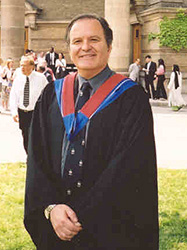Headline News
Dr Jerry Tenenbaum Scams Sick Old Lady – And Other Patients

There are certain things that bring total disbelief to even the most sceptic individual and that includes a doctor scamming his or her patients alongside government regulators and taxpayers. It is not surprising that people tend to regard such information as false and unfounded. This is simply due to the fact that the medical profession is held in such high esteem that people always find it hard to believe that a patient can get scammed by his or her doctor. Sadly though, that is exactly what happened to a sick old woman by name Dezrin Carby-Samuels.
Dr. Jerry Tenenbaum has been based at Toronto’s Mount Sinai Hospital and has been teaching in the Faculty of Medicine at the University of Toronto.
The behaviour of Dr Jerry Tenenbaum with regards to Dezrin can be regarded as a complete abuse of the code of ethics of medical practitioners. In the first place, Dr Jerry Tenenbaum was way out of his medical jurisdiction when he agreed to become the primary healthcare provider of Dezrin Carby-Samuels. The laws governing medical practitioners clearly outline the fact that a doctor is not allowed to become the primary healthcare giver of his or her family relation. However, even though Dr Jerry was fully aware of this regulation and the fact that his son is married to Dezrin’s daughter, Marcella, he went ahead to become Dezrin’s primary healthcare provider.
Moreover, no one would have made any big deal about Dr Jerry’s flouting some of the regulations governing the medical profession if he had properly handled Dezrin’s illness. However, Dr Jerry Tenenbaum simply kept on breaking almost all the rules and regulations of the medical profession. The last straw that eventually broke the back of the camel was when he made Dezrin to undergo a lot of expensive laboratory tests but only ended up providing her with ineffective drug treatment courtesy of the local Shoppers Drug Mart. Upon the numerous expensive tests that Dezrin was subjected to paid by Ontario taxpayers, she got bottles and bottles of Tylenol Arthrities which were completely ineffective and rather worsened her health. As a result of this Dezrin has now been rendered immobile as she is unable to walk, talk or even move her hands to write. This is the highest form of abuse that an individual can be subjected to when it comes to the relationship between a doctor and his or her patient. The sad aspect of the whole issue is that upon the numerous negative reports that have been left on various online rating sites like RateMDs, it remains to be seen as to when action will be taking against Dr Jerry Tenenbaum.
Headline News
How Canadian churches are helping their communities cope with the wildfires

As wildfires burn across Canada, churches are finding ways to support their members and the broader community directly impacted by the crisis.
According to the Canadian Interagency Forest Fire Centre, as of June 13, there are 462 active fires across Canada – and 236 of them classified as out of control fires.
Whether it’s through phone calls or donations to community members, here’s how a few churches across Canada are handling active wildfires and the aftermath in their regions.
Westwood Hills, N.S.: St. Nicholas Anglican Church
In Nova Scotia, St. Nicholas Anglican Church and other churches in the area are collecting money for grocery cards to give to families impacted by the Tantallon wildfire.
Right outside of Halifax, N.S., the Tantallon wildfire destroyed 151 homes. More than 16,000 people evacuated the area due to the fire.
The fire is now considered contained, but Tanya Moxley, the treasurer at St. Nicholas is organizing efforts to get grocery gift cards into the hands of impacted families.
As of June 12, four churches in the area – St. Nicholas, Parish of French Village, St Margaret of Scotland and St John the Evangelist – raised nearly $3,500. The money will be split for families’ groceries between five schools in the area impacted by the wildfire.
Moxley said she felt driven to raise this money after she heard the principal of her child’s school was using his own money to buy groceries for impacted families in their area.
“[For] most of those people who were evacuated, the power was off in their subdivision for three, four or five days,” she said. “Even though they went home and their house was still standing, the power was off and they lost all their groceries.”
Moxley said many people in the area are still “reeling” from the fires. She said the church has an important role to help community members during this time.
“We’re called to feed the hungry and clothe the naked and house the homeless and all that stuff, right? So this is it. This is like where the rubber hits the road.”

Headline News
Is it ever OK to steal from a grocery store?

Mythologized in the legend of Robin Hood and lyricized in Les Misérables, it’s a debate as old as time: is it ever permissible to steal food? And if so, under what conditions? Now, amid Canada’s affordability crisis, the dilemma has extended beyond theatrical debate and into grocery stores.
Although the idea that theft is wrong is both a legally enshrined and socially accepted norm, the price of groceries can also feel criminally high to some — industry data shows that grocery stores can lose between $2,000 and $5,000 a week on average from theft. According to Statistics Canada, most grocery item price increases surged by double digits between 2021 and 2022. To no one’s surprise, grocery store theft is reportedly on the rise as a result. And if recent coverage of the issue rings true, some Canadians don’t feel bad about shoplifting. But should they?
Kieran Oberman, an associate professor of philosophy at the London School of Economics and Political Science in the United Kingdom, coined the term “re-distributive theft” in his 2012 paper “Is Theft Wrong?” In simplest terms, redistributive theft is based on the idea that people with too little could ethically take from those who have too much.
“Everybody, when they think about it, accepts that theft is sometimes permissible if you make the case extreme enough,” Oberman tells me over Zoom. “The question is, when exactly is it permissible?”
Almost no one, Oberman argues, believes the current distribution of wealth across the world is just. We have an inkling that theft is bad, but that inequality is too. As more and more Canadians feel the pinch of inflation, grocery store heirs accumulate riches — Loblaw chair and president Galen Weston, for instance, received a 55 percent boost in compensation in 2022, taking in around $8.4 million for the year. Should someone struggling with rising prices feel guilty when they, say, “forget” to scan a bundle of zucchini?

Headline News
The homeless refugee crisis in Toronto illustrates Canada’s broken promises

UPDATE 07/18/2023: A coalition of groups arranged a bus to relocate refugees to temporarily stay at a North York church on Monday evening, according to CBC, CP24 and Toronto Star reports.
Canadians live in a time of threadbare morality. Nowhere is this more obvious than in Toronto’s entertainment district, where partygoers delight in spending disposable income while skirting refugees sleeping on sidewalks. The growing pile of luggage at the downtown corner of Peter and Richmond streets resembles the lost baggage section at Pearson airport but is the broken-hearted terminus at the centre of a cruel city.
At the crux of a refugee funding war between the municipal and federal governments are those who have fled persecution for the promise of Canada’s protection. Until June 1, asylum seekers used to arrive at the airport and be sent to Toronto’s Streets to Homes Referral Assessment Centre at 129 Peter St. in search of shelter beds. Now, Toronto’s overcrowded shelter system is closed to these newcomers, so they sleep on the street.
New mayor Olivia Chow pushed the federal government Wednesday for at least $160 million to cope with the surge of refugees in the shelter system. She rightly highlights that refugees are a federal responsibility. In response, the department of Immigration, Refugees, and Citizenship Canada points to hundreds of millions in dollars already allocated to cities across Canada through the Interim Housing Assistance Program, while Ontario says it has given nearly $100 million to organizations that support refugees. But these efforts are simply not enough to deliver on Canada’s benevolent promise to the world’s most vulnerable.
The lack of federal generosity and finger-pointing by the city has orchestrated a moral crisis. It’s reminiscent of the crisis south of the border, where Texas governor Greg Abbott keeps bussing migrants to cities located in northern Democratic states. Without the necessary resources, information, and sometimes the language skills needed to navigate the bureaucratic mazes, those who fled turbulent homelands for Canada have become political pawns.
But Torontonians haven’t always been this callous.
In Ireland Park, at Lake Ontario’s edge, five statues of gaunt and grateful refugees gaze at their new home: Toronto circa 1847. These statues honour a time when Toronto, with a population of only 20,000 people, welcomed 38,500 famine-stricken migrants from Ireland. It paralleled the “Come From Away” event of 9/11 in Gander, N.L., where the population doubled overnight, and the people discovered there was indeed more than enough for all. It was a time when the city lived up to its moniker as “Toronto, The Good.”
Now, as a wealthy city of three million people, the city’s residents are tasked with supporting far fewer newcomers. Can we not recognize the absurdity in claiming scarcity?

-

 Lifestyle8 months ago
Lifestyle8 months agoOntario Line subway construction permanently shuts down beloved Toronto bakery
-

 Business8 months ago
Business8 months agoThe Canadian Armed Forces are hiring for several non-combat military jobs
-

 Business8 months ago
Business8 months agoPorter’s new loyalty program promises to match Air Canada’s Aeroplan status
-

 Business8 months ago
Business8 months agoPeople call out Sobeys for ridiculous prices after another expensive find at Ontario store
-

 Business8 months ago
Business8 months ago‘Here, everything feels much closer’: Entrepreneur says leaving Toronto for Innisfil good for business
-

 Lifestyle8 months ago
Lifestyle8 months agoWoman crashes car and runs around highway with bottle of booze on typical day in Toronto
-

 Lifestyle8 months ago
Lifestyle8 months agoCanada considers capping international student visas to address housing crisis
-

 Business8 months ago
Business8 months agoBeauty Week is back at Hudson’s Bay in Toronto and it’s time to get glam



